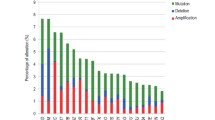Abstract
Protein tyrosine phosphatases (PTP) counteract the enzymatic activity of protein tyrosine kinases. Impaired activity of some members of the PTP family has been found in cancer cells of different malignancies. We have characterized defects in the function of a PTP which negatively regulates the receptor tyrosine kinases FLT3 (Fms-like tyrosine kinase 3), and PDGFR (platelet-derived growth factor receptor) in acute myeloid leukaemia and meningioma cells.
Similar content being viewed by others
Literatur
Tonks NK (2006) Protein tyrosine phosphatases: from genes, to function, to disease. Nat Rev Mol Cell Biol 7:833–846
Elchebly M, Payette P, Michaliszyn E et al. (1999) Increased insulin sensitivity and obesity resistance in mice lacking the protein tyrosine phosphatase-1B gene. Science 283:1544–1548
Müller JP, Schönherr C, Markova B et al. (2008) Role of SHP2 for FLT3-dependent proliferation and transformation in 32D cells. Leukemia 22:1945–1948
Neel BG, Gu H, Pao L (2003) The ’shp’ing news: SH2 domain-containing tyrosine phosphatases in cell signaling. Trends Biochem Sci 28:284–293
Julien SG, Dube N, Hardy S et al. (2011) Inside the human cancer tyrosine phosphatome. Nat Rev Cancer 11:35–49
Östman A, Hellberg C, Böhmer FD (2006) Proteintyrosine phosphatases and cancer. Nat Rev Cancer 6:307–320
Arora D, Stopp S, Böhmer SA et al. (2011) Proteintyrosine phosphatase DEP-1 controls receptor tyrosine kinase FLT3 signaling. J Biol Chem 286:10918–10929
Godfrey R, Arora D, Bauer R et al. (2012) Cell transformation by FLT3 ITD in acute myeloid leukemia involves oxidative inactivation of the tumor suppressor protein-tyrosine phosphatase DEP-1/PTPRJ. Blood 119:4499–4511
Petermann A, Haase D, Wetzel A et al. (2011) Loss of the protein-tyrosine phosphatase DEP-1/PTPRJ drives meningioma cell motility. Brain Pathol 21:405–418
Östman A, Frijhoff J, Sandin A et al. (2011) Regulation of protein tyrosine phosphatases by reversible oxidation. J Biochem 150:345–356
Author information
Authors and Affiliations
Corresponding author
Additional information
Jörg P. Müller Biologiestudium an den Universitäten Rostock und Dresden. 1984-1987 Arzneimittelwerk Dresden. 1988–1991 Zentralinstitut für Mikrobiologie und experimentelle Therapie in Jena, DDR-Akademie der Wissenschaften, 1989 Promotion (Dr. rer. nat.). 1991–1995 Postdoc in Groningen, Niederlande und Newcastle, UK. 1996–2002 Assistenz an der Biologisch-Pharmazeutischen Fakultät an der Universität Jena, 2001 Habilitation im Fach Molekularbiologie. Seit 2003 Institut für Molekulare Zellbiologie, Universitätsklinikum Jena.
Christian Mawrin 1992–1998 Medizinstudium an der Universität Magdeburg. 2000 Promotion (Dr. med.). 2005 Facharzt für Neuropathologie und Habilitation. 2006–2008 W2-Professur und Leitung der Abteilung Neuropathologie am Universitätsklinikum Jena. Seit 2008 Direktor des Instituts für Neuropathologie, Universitätsklinikum Magdeburg.
Astrid Petermann Biochemiestudium an der Universität Jena, 2007–2010 Promotion (Dr. rer. nat.) am Institut für Molekulare Zellbiologie, Universitätsklinikum Jena. 2011 Postdoc in der AG Experimentelle Rheumatologie, Universitätsklinikum Jena, anschließend am Institut für Molekulare Zellbiologie.
Frank-D. Böhmer 1975 Biochemiestudium, Universität Halle, 1980 Promotion (Dr. rer. nat.), Zentralinstitut für Molekularbiologie, Berlin-Buch, DDR-Akademie der Wissenschaften. 1992–1997 Projektleiter, Max-Planck-Arbeitsgruppe „Signaltransduktion von Wachstumsfaktoren“, Jena. 1995 Habilitation in Biochemie. Seit 2001 Dozent für Molekulare Zellbiologie, Institut für Molekulare Zellbiologie am Universitätsklinikum Jena.
Rights and permissions
About this article
Cite this article
Müller, J.P., Petermann, A., Mawrin, C. et al. Tumorzellen — Vehikel mit defekten Bremsen. Biospektrum 18, 394–397 (2012). https://doi.org/10.1007/s12268-012-0200-1
Published:
Issue Date:
DOI: https://doi.org/10.1007/s12268-012-0200-1




